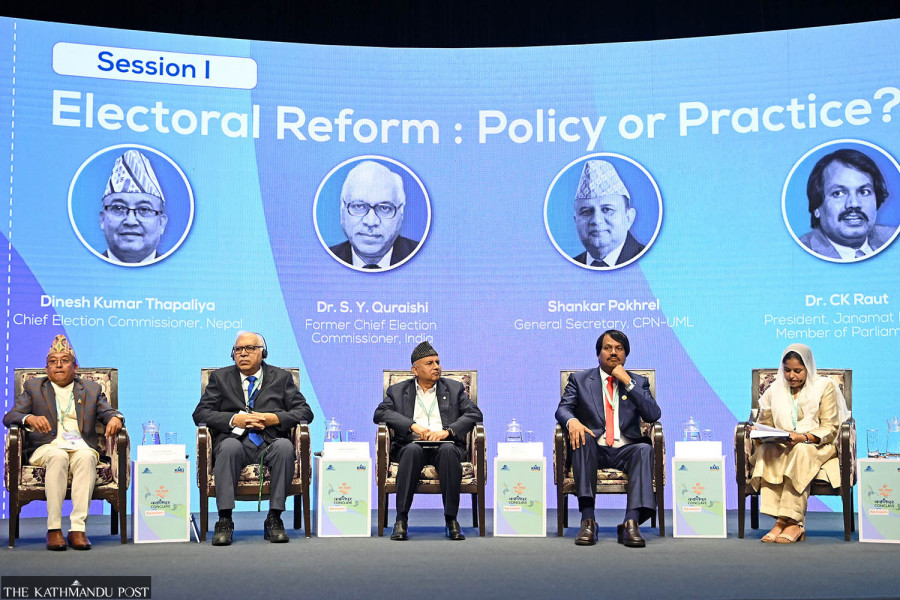National
Experts and leaders call for electoral reforms to strengthen democracy
Former chief election commissioner S Y Quraishi of India describes Nepal’s constitution as more progressive than India’s, particularly regarding women’s representation.
Post Report
Experts and political leaders at the Kantipur Conclave 2024 emphasised the need for reforms in the electoral system and practices to strengthen Nepal’s democracy.
Speaking at the session ‘Electoral reform: Policy or practice?’ on the second day of the conclave, Chief Election Commissioner Dinesh Thapaliya called for enhanced structural and policy reforms to empower Nepal’s election commission.
Thapaliya outlined key challenges and areas for reform, highlighting that Nepal’s constitution already provides a framework for streamlining elections.
However, he said the system needs ongoing improvements in governance, law, policy, and operational mechanisms to address structural shortcomings.

Thapaliya stressed the need for making the election commission autonomous, allowing it to function more independently and as per its own plans.
He noted that, unlike in other nations, Nepal’s election commission often remains uninformed about poll schedules until the government designates a date, which he sees as an obstacle to effective electoral management. “The commission itself doesn’t know when it has to conduct an election until the government fixes a date,” he said.
Also speaking at the session, former chief election commissioner of India SY Quraishi said that meaningful electoral reform requires strong political will and party consensus—both often lacking in South Asia.
He said key issues such as inclusiveness, money, power, and criminal influence remain the major electoral challenges in the region.
Quraishi commended Nepal’s progress describing its constitution as more progressive than India’s, particularly regarding women’s representation.
“While India only recently enacted a law for 33 percent women’s reservation in parliament, effective from 2029, Nepal achieved this milestone in 2015. Nepal’s local units also provide substantial power to women, marking a significant step forward in governance reform in South Asia,” he said.

Reflecting on India’s challenges, Quraishi stated that female representation in India has remained below 10 percent for most of its 75-year history, only recently reaching 11 percent.
“Despite politicians’ claims that women face low election chances due to limited funding, data since 1951 show women having a 50 percent higher success rate than male candidates. In states like West Bengal and Odisha, leaders such as Mamata Banerjee and Navin Patnaik have allocated a high proportion of tickets to women, resulting in strong performances without relying on reserved seats,” he said.
Regarding election financing, Quraishi criticised India’s system of imposing spending limits on individual candidates but not on political parties, which he argued doesn’t ensure a level playing field for all contestants. He advocated for a cap on both candidate and party expenditures.
UML General Secretary Shankar Pokhrel suggested major reforms to Nepal’s electoral system, blaming the mixed election methods for political instability and frequent government changes.

Regarding election policies, Pokhrel recommended raising the election threshold to 5 percent for national and provincial seats to strengthen governance stability. At present, political parties in Nepal must secure at least 3 percent of total votes under the proportional representation (PR) in the House of Representatives and 1.5 in a provincial assembly to be eligible to get PR seats.
Increasing the threshold means the votes garnered by the fringe political parties disqualifying to secure PR seats is distributed to the national parties on a proportional ratio making big parties bigger.
He argued that Nepal’s mixed electoral system prevents any party from gaining a clear majority. According to Pokhrel, this system has contributed to political instability, making it challenging to form stable governments. He asserted that ensuring proportional representation is possible even through directly elected seats.
Pokhrel said that strengthening the federal system requires more than just electoral reforms. He noted the absence of key laws, including the Civil Service Act, Police Act, and Education Act, while noting that several existing laws need to be further aligned with the constitutional framework, making a review urgent.
Pokhrel underscored the need for a robust provincial structure, criticising the federal parliament for weakening provinces by limiting their access to natural resources. “Federal systems typically empower provinces, but in Nepal, resource crunch has hindered provinces from achieving full effectiveness in the federal framework,” he said.
Janamat Party Chairperson and federal lawmaker CK Raut said Nepal’s proportional system is essential for inclusion in a country with over 100 languages and communities. “Nepal is a hugely diverse country, and I believe proportional representation is crucial for us,” he said.

Raut raised serious concerns over the growing debate in Nepal on adopting a two-party system purportedly to ensure political stability. He warned that such a system could harm the country's inclusivity.
Chief ministers lambast centre for not devolving powers
In another session at the Conclave, chief ministers of the seven provinces complained that the provincial governments had become inefficient due to the federal government’s reluctance to devolve power.
Gandaki Chief Minister Surendra Raj Pandey criticised the federal parliament and government for not formulating the laws needed for a smooth functioning of the country’s federal structure.
“In the era of 5G, the condition of federalism is like 2G,” Pandey said, sarcastically.
Chief Minister of Madhesh Province Satish Kumar Singh blamed bureaucracy, also called the permanent government, for the low efficiency of the federal system.
Acting Chief Minister of Lumbini Bhumeshwar Dhakal to Koshi Chief Minister Hikmat Karki, Karnali Chief Minister Yamlal Kandel, Bagmati Chief Minister Bahadur Singh Lama and Sudurpaschim Chief Minister Kamal Bahadur Shahi, who aired their views at the session, accusing the federal government of not giving the subnational governments proper roles.
The fourth edition of the Kantipur Conclave, themed ‘Democracy in Dilemma’, concluded on Thursday.




 10.12°C Kathmandu
10.12°C Kathmandu














